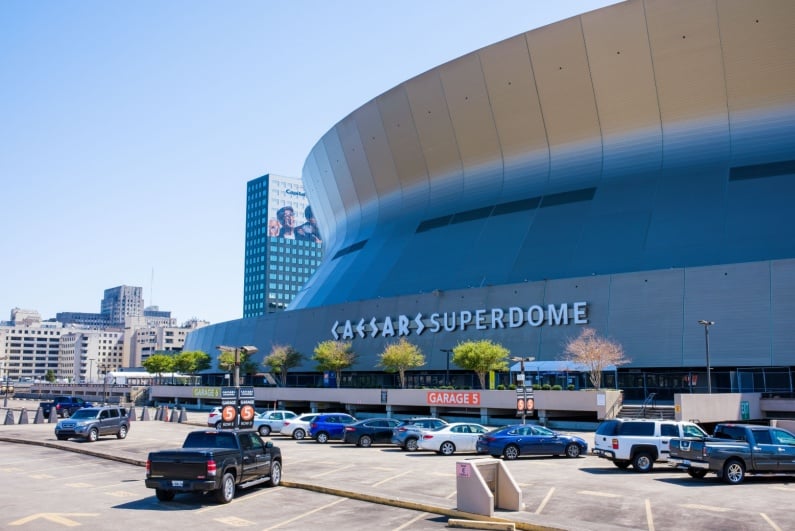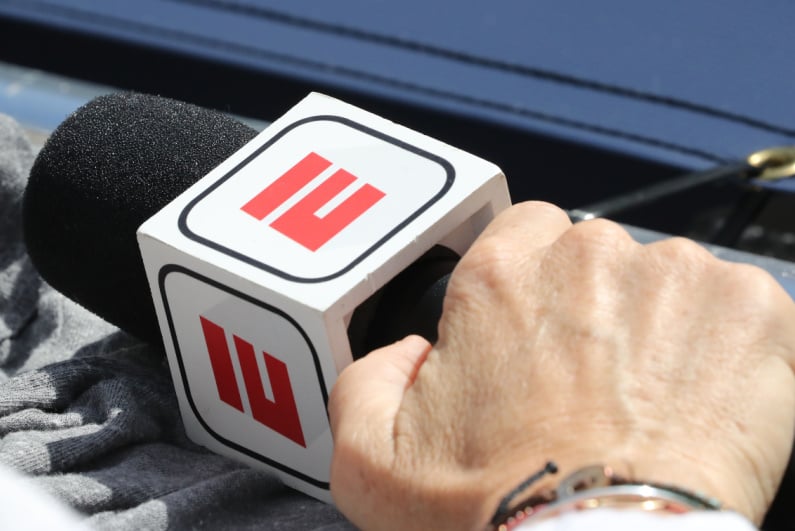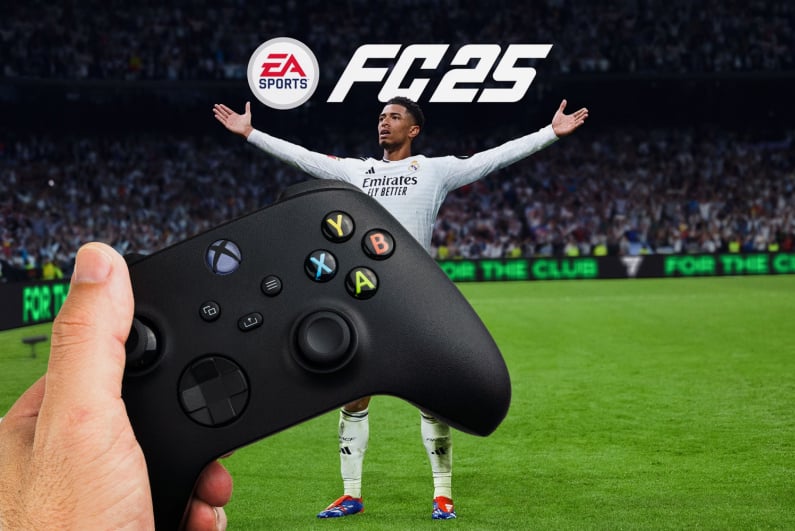The “Greatest Show on Earth”
Super Bowl LIX is almost upon us. Predictably, the Kansas City Chiefs have again made it to the so-called “Greatest Show on Earth” but slightly less predictable is that they are facing the Philadelphia Eagles in New Orleans’ Caesars Superdome on Sunday (6:30pm ET).
The Superdome is no stranger to the Super Bowl. In fact – as you will have probably already seen or heard – it is the stadium that has hosted it the most. Seven times, to be precise, before the first ball is kicked on Sunday. New Orleans will also tie with Miami on Sunday as the city has hosted the most Super Bowls.
among the best and most controversial Super Bowls to be played
But there’s more to the Superdome than just being a record-breaker in terms of how many times it’s played host. The games have been among the best and most controversial Super Bowls to be played, and everything points to LIX being no different.
This year’s cast is as star-studded as it gets in the NFL, with the Chiefs roster containing superstars like Chiefs’ quarterback Patrick Mahomes, tight end Travis Kelce, and defensive tackle Chris Jones, and on the Eagles’ squad, quarterback Jalen Hurts, running back Saquon Barkley and linebacker Nolan Smith Jr.
But it’s not always the big names and the game that make the stories. So let’s lift the lid on the previous seven Super Bowls held at the Superdome and unearth some facts that you may not know or remember.
Super Bowl XII
January 15, 1978: Dallas Cowboys 27, Denver Broncos 10
This was the first-ever Super Bowl to be played indoors and was ultimately a triumph for the Cowboys’ famous Doomsday Defense. They were able to force eight turnovers in the game and only allowed eight completions by Denver quarterback Craig Morton for just a paltry 61 yards.
Before the game, the media had decided the big story was going to be Dallas QB Roger Staubach versus Morton, who had begun his own NFL career with the Cowboys, but it was the defensive players who dominated the game.
For the first time in Super Bowl history, the Most Valuable Player (MVP) honors were shared, with Dallas defensive tackle Randy White and defensive end Harvey Martin both getting a hand on the trophy.
Another interesting fact was that Dallas running back Tony Dorsett became the first player ever to win a college football national championship and then a Super Bowl in consecutive seasons. Both also occurred on the same field in the same stadium as one year earlier, when Dorsett’s University of Pittsburgh team won the Sugar Bowl with a victory over Georgia.
This win for the Cowboys meant they were the only team from the NFC to win a Super Bowl in the 1970s.
Super Bowl XV
January 25, 1981: Oakland Raiders 27, Philadelphia Eagles 10
This one had all the controversy you expect from a Super Bowl and more!
In the week leading up to the game, Raiders controversial defensive end John “Tooz” Matuszak promised to keep his Raiders on the straight and narrow in the lead-up but was then discovered to have gone out drinking heavily every night!
Raiders coach Tom Flores fined the 6-foot-8 giant $1,000, but Eagles’ coach Dick Vermeil stirred the pot by saying the punishment was too lenient. Quote: “If he was an Eagle, he’d be on a flight back to Philadelphia right now.”
Matuszak’s response was, “Why would anybody want to go to Philadelphia in the winter?”
There was also ongoing tension between NFL commissioner Pete Rozelle and Raiders owner Al Davis. This spilled over into the Raiders’ playing squad. The artificial turf for the game had been painted with realistic-looking NFL footballs that contained Rozelle’s signature, but prior to the game, Raiders guard Gene Upshaw used his cleats to scuff the Rozelle signature on one of the balls.
On the day, the Raiders were simply too good and too strong for the Eagles, but the drama was unabating and before the end of the game, the NFL received credible death threats for Raiders defenders Lester Hayes and Rod Martin. Both players were escorted from the field before the end of the game as the clock wound down.
Super Bowl XX
January 26, 1986: Chicago Bears 46, New England Patriots 10
The score tells you all you need to know about this one, with the Bears’ dominance making this one of the most one-sided Super Bowls ever. The NFL execs who were hoping their 1986 showpiece event would produce a game worthy of the occasion were to be disappointed.
Chicago had a team full of characters and also had a defense to die for, but the lead-up to the game was dominated by injury doubts over Bears quarterback Jim McMahon. An injured buttock, of all things, was the subject of much media attention, but McMahon mooning a helicopter that hovered over their practice field gave a clue to his fitness.
In the end, some acupuncture, which McMahon described as a “pain in the ass,” did the trick, and he led his team to victory aided by his team’s magnificent defense.
But, despite the huge winning margin, the game was notable for things that didn’t happen rather than for things that did. For example, despite putting 46 points on the board, legendary running back Walter Payton did not score a single touchdown in the game, even though the Bears got to the one-yard line.
With everyone waiting for Payton to go over the top, William “The Refrigerator” Perry used a firm handoff to go over, leaving Payton without a TD.
Super Bowl XXIV
January 28, 1990: San Francisco 49ers 55, Denver Broncos 10
The Super Bowl is, of course, one of the most-watched TV events of the year worldwide but, oddly, not so for this one. It remains the lowest-rated Super Bowl of all time.
The 55 points put on the board by San Francisco still stand as a Super Bowl scoring record. It was the final time that legendary 49ers quarterback Joe Montana got his hands on the Vince Lombardi trophy.
So brilliant was Montana that day, and in the post-season games leading to Super Bowl XXIV, his passer rating was 146.4 for that year’s playoffs – a number only bettered by the Buffalo Bills’ Josh Allen in 2021 and this year by Tampa Bay’s Baker Mayfield, though the latter was in only one game.
a 49ers blowout and 460 yards on offense?
An interesting and slightly spooky footnote to this game was that in the week leading up to the game, former 49ers coach Bill Walsh had written a guest column in a San Francisco newspaper in which he predicted a 49ers blowout and 460 yards on offense for them.
In the end, it was definitely a blowout and they went for 461 yards on offense!
It was also the first time the NFL had brought back all of its former Super Bowl MVPs for the game — something that is now a tradition. That day, two-time winner Super Bowl winner Bart Starr performed the coin toss.
It was a grim day for the Broncos in general, but particularly for their quarterback, John Elway. Two hours after the game he was spotted by the press pack walking, hand-in-hand, with his wife across the field. As is typical for reporters, they seized upon him and fired a thousand questions in his direction, but Elway was not in the mood.
“Can’t you let a guy sulk in peace?” was his now-famous retort.
Super Bowl XXXI
January 26, 1997: Green Bay Packers 35, New England Patriots 21
This one is, unfortunately, remembered for all the wrong reasons. In the lead-up to the game, a stuntwoman by the name of Laura Patterson was tragically killed in a bungee-jumping accident inside the dome as she practiced for the half-time show.
The halftime show, which featured the Blues Brothers, was specially dedicated to Patterson. It was an enormous production with a massive stage designed to look like a riverboat. It was so big, in fact, that the goalposts had to be removed in order to accommodate it.
Unfortunately, the team responsible for the set had problems putting the posts back into the ground and the start of the third quarter was delayed! In the end, NFL legend and commentator John Madden used a Telestrator to show them how it should be reassembled.
The game itself was effectively a home game for Green Bay quarterback Brett Favre, who grew up just an hour from the stadium. And he made it count with a fine display of accurate passing and game management. But it was Green Bay returner Desmond Howard who was voted the MVP after sensationally running back a kickoff 99 yards for a touchdown.
In the week leading up to the game, all the talk in the media had been about the future of Patriots coach Bill Parcells and whether or not he would sign a new contract. Even the Packers were miffed by all of the talk being about Parcells and they used it as motivation.
Green Bay coach Mike Holmgren barely warranted a mention in the press and Packers safety LeRoy Butler was famously quoted as saying: “Everything was Parcells, Parcells, Parcells … I know coach Parcells wants attention, but next time he should have more respect for coach Holmgren.”
Super Bowl XXXVI
February 3, 2002: New England Patriots 20, St. Louis Cardinals 17
This one was extra poignant as it was the first Super Bowl after the 9/11 terrorist attacks, which forever changed the way the NFL managed the big game. This included changing simple things like paper credentials for media and the thousands of others working at the game to complete background checks on all the personnel involved. It was a new system that was devised in the space of just two months, so the Super Bowl of 2002 had a very different look and feel.
One of NFL’s biggest fears was the threat of an anthrax attack, so the stadium’s massive air-filtration system was completely redone and extensive measures were put in place to secure the it.
Security was so tight inside the stadium on gameday that one of the pre-game performers – an unknown by the name of Paul McCartney – was held outside the stadium entrance until authorities sought permission to let him in.
a potential anthrax attack
Also, around the security perimeter of the Superdome, there were water trucks poised and manned by personnel from all the federal agencies. Again, this was in place to thwart a potential anthrax attack, and in case fans needed to be watered and washed in an emergency.
Because the NFL had postponed a round of games in the week after the attacks, all other games, including the Super Bowl, were pushed back one week. Therefore, Super Bowl XXXVI became the first one ever to be played in February – something that is now a common occurrence.
The game itself was almost secondary given the background to it, but it concluded in a huge upset. Most pundits predicted a comfortable win for the mighty St. Louis Rams but instead, a young quarterback by the name of Tom Brady made his mark on the sport’s biggest stage for the first time.
It was a sign of things to come. The start of the era of Brady.
Super Bowl XLVII
February 3, 2013: Baltimore Ravens 34, San Francisco 49ers 31
This one was known as the Bros Bowl in some quarters as it featured coaching brothers John and Jim Harbaugh — Jim’s 49ers going up against John’s Ravens.
A further twist – a behind-the-scenes story that broke in the week leading up to the game – was that Jim’s son Jay had been appointed as a coaching intern for the Ravens. This meant that to win a Super Bowl ring, Jay and his fellow coaches would have to stop his father from winning one.
As it transpired, the Ravens appeared to be in firm control of the game going into the second half when the game took an unlikely twist: as a result of a power outage in the stadium, the lights went out for 34 minutes!
The 49ers used this break to their advantage and when the lights came back on, they were re-energized. They went on to score 17 unanswered points and in doing so, turned a potential blowout into a down-to-the-wire thriller. The Ravens were made to strain every sinew to win by just three points.
In the end, the Ravens’ victory was remembered for a spectacular Jacoby Jones touchdown – a second-half kickoff return for 108 yards. It was the ninth kickoff return touchdown in Super Bowl history.




